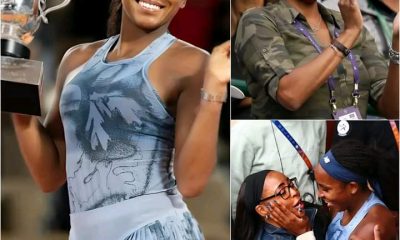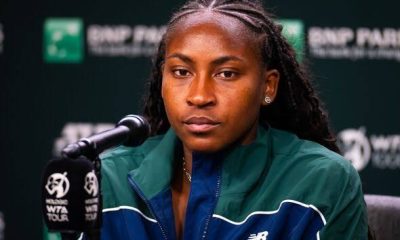Coco Guaff
“I have heard I am stupid” – Coco Guaff reveals how coaches brutally crush her confidence due to Controversies On…

“I Have Heard I Am Stupid” – Coco Gauff Reveals How Coaches Brutally Crushed Her Confidence Amid Ongoing Controversies
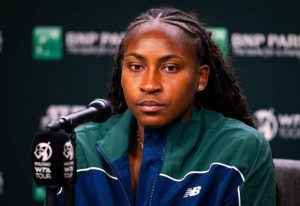
In the dazzling world of professional tennis, Coco Gauff has long stood as a beacon of poise, talent, and promise.
From the moment she stunned Venus Williams at Wimbledon in 2019 as a 15-year-old phenom, the world has watched her every move.
But behind the radiant smile, electrifying speed, and Grand Slam success lies a more complicated truth—one not often revealed to cameras or fans.
In an unflinchingly honest interview following her controversial early exit from the 2025 Madrid Open, Coco Gauff offered a rare glimpse into her inner world.
In doing so, she shattered the illusion that greatness always comes with peace of mind.
“I’ve heard I’m stupid. I’ve had coaches question if I could ever ‘think’ my way through a match. They made me feel like I was only fast and strong—not smart. And it stuck with me.”
These words stunned fans and pundits alike. How could one of the most articulate, disciplined, and hardworking players of her generation internalize such cruelty?
How could someone with such a rapid rise—U.S. Open champion, Olympic flag bearer, and multiple Grand Slam finalist—be battling voices from within her own circle?
This article explores Coco Gauff’s incredible journey, the pressures she has faced behind the scenes, and the ways certain coaching environments, often male-dominated and results-obsessed, have threatened to erode her self-worth.
It’s a story of survival in a sport where success isn’t just physical—it’s psychological.
The Weight of Expectations
Cori “Coco” Gauff didn’t just step into professional tennis—she exploded into it. At just 15, her name was on the lips of commentators, sponsors, and fans across the globe.
With that sudden fame came endorsements, media obligations, and sky-high expectations.
But as her star rose, so did the voices around her—coaches, analysts, and former pros with opinions.
Many applauded her athleticism, calling her “a physical freak” or “the fastest on tour,” but few commented on her court intelligence or tactical development.
“Even when I won, people focused on my speed or my serve. They didn’t talk about the strategy,” Gauff said. “I started wondering if maybe I wasn’t a smart player—just a fast one.”
And inside her own team, the reinforcement of that narrative began taking root.
Early Coaching Conflicts
In the early years of her WTA career, Gauff was surrounded by a rotating cast of coaches—some hired for technical skill, others for their supposed tactical mastery.
But she reveals that some of those coaches took a brutally critical approach, often using mental pressure in an attempt to forge resilience.
“There were times after matches where I’d be told, ‘You don’t think like a champion.’ Or ‘Your brain shuts off under pressure.’ At first, I thought it was tough love. Then it just felt like abuse.”
She describes being second-guessed constantly in team meetings.
“I’d say what I thought happened in a point, and I’d be told, ‘No, that’s wrong, you’re not seeing the court right.’ Eventually, I just stopped speaking.”
The implication was clear: she wasn’t to be the thinker. She was to be the executor. Her job was to run, hit, and obey.
Controversies, Criticism, and the Public Eye
Gauff’s 2024 season was a mixed bag of triumphs and setbacks.
Though she reached the semifinals of the Australian Open and earned a silver medal at the Paris Olympics, several losses—including a high-profile collapse at the WTA Finals—reignited criticisms of her shot selection, match IQ, and game management.
Pundits pointed fingers, calling her forehand “a liability” and her decision-making “immature.” But behind the scenes, Gauff says the judgment was even harsher.
“One coach told me flat out: ‘You don’t have the brain to beat Iga Swiatek.’ I remember that night clearly. I sat in my hotel room and cried.”
It wasn’t just the opponents that haunted her; it was the constant suspicion that perhaps she was too emotional, too reactive, too dependent on physical gifts.
“I started to feel like a fraud. Like I didn’t belong in strategy conversations.”
Breaking Point: Madrid 2025
At the 2025 Madrid Open, Gauff was ousted in the third round by an unseeded qualifier.
Cameras captured an uncomfortable scene during a changeover where she appeared to argue with her box, eventually turning away in tears.
What followed was her bombshell post-match interview.
“It’s hard to perform when you’re always being told you don’t think fast enough, that you don’t have the mind of a champion.
I’m not dumb. I see patterns. I know tactics. But when you’re always second-guessed, you start second-guessing yourself.”
The tennis world took notice. Social media exploded in support, with #WeHearYouCoco trending worldwide.
Gendered Dynamics in Coaching
Experts say Gauff’s experience is unfortunately not unique. Female players often report that their intelligence and strategic input are dismissed by coaching teams.
Dr. Melissa Erhardt, a sports psychologist and consultant to several WTA athletes, explains:
“There’s a tendency in some coaching cultures to infantilize young women—telling them what to do rather than developing their decision-making skills. When they speak up, it’s seen as emotional or rebellious.”
Gauff’s maturity, media savvy, and eloquence have made her a spokesperson for Gen-Z athletes, but inside the player’s box, she often felt unheard.
“I was being told what I ‘should’ feel, what I ‘should’ see in a match. But I was the one on the court. I needed space to trust my instincts,” Gauff says.
From Silence to Empowerment
Following the Madrid fallout, Gauff made sweeping changes to her team. She let go of several long-time members and brought on a sports psychologist and new strategic advisor—a former female pro who encourages her to take ownership of her game plan.
“Now I walk into meetings and I speak first. I say, ‘Here’s what I saw. Here’s what I think I need.’ It’s changed everything.”
Her father, Corey Gauff, who coached her as a child, reportedly stepped further back to give Coco full autonomy over her decisions.
“He said, ‘This is your career. You’re the boss now.’ That meant the world.”
Championing Mental Health and Intelligence
Gauff has since begun advocating more openly for mental health awareness in tennis. At a Players’ Panel ahead of the French Open, she spoke candidly about the damaging effects of internal criticism.
“We talk about self-belief all the time in tennis. But what about when your own team takes that belief away?”
She’s now working on launching a foundation focused on empowering young athletes, particularly girls, to trust their intellect and emotional strength—not just their athleticism.
“I want to coach one day. But I want to coach minds, not just bodies.”
The Road Ahead: U.S. Open 2025 and Beyond
With the U.S. Open around the corner, Gauff appears more centered than ever.
She’s brought her strategy sessions in-house, with her coach asking her to lead tactical discussions before matches.
“We watch film together, but I get to say what I see. It’s collaborative now.”
Asked about her ambitions for the next phase of her career, she doesn’t mention rankings or trophies first.
“I want to build a space in tennis where no 16-year-old girl ever hears she’s ‘not smart enough.’ Because I did. And I know how much that hurts.”
Conclusion: Breaking Chains, Building Legacy
Coco Gauff’s journey isn’t just about becoming a tennis champion—it’s about overcoming systemic dismissal, reclaiming self-worth, and transforming pain into purpose.
Her statement, “I have heard I am stupid,” isn’t a confession of weakness. It’s a powerful testimony of endurance.
It is the beginning of a revolution—one in which athletes are respected not only for what they do, but for how they think and who they are.
For Gauff, the future is not just on the court—it’s in every girl who watches her and realizes she, too, is smart enough, brave enough, and strong enough to define her own story.
-

 Liverpool News5 months ago
Liverpool News5 months ago“He Spoke To Me”: Trent Alexander-Arnold breaks Silence on Real Madrid Snub and Finally Reveal The Reason Why He’s Staying at Liverpool After an Advice From….
-

 Liverpool News6 months ago
Liverpool News6 months ago5 Minutes AGO: A Poor Newborn Baby Was Abandoned in a Park Near His Home After The Leicester City Game, in Response To This Heartbreaking Situation, Star Trent Alexander Arnold Stepped In to Become The Child’s Guardian, Pledging To Pay All Living Expenses Until The Child Turns 18….
-

 Liverpool News6 months ago
Liverpool News6 months agoBREAKING NEWS: live from Fabrizio romano, “LET ME GO” Liverpool target set to hand in transfer request to join Liverpool with immediate effect. He said, “I’ve made it clear to the club—I want to leave. The moment I heard Liverpool were interested, my mind was made up. This is a club you don’t say NO to, and I won’t risk waiting around. This is my career, my future, and I’m taking control of it. I’m handing in a transfer request because I want to wear that red shirt. Let me go—this isn’t a request, it’s a warning. My decision is final. It’s Liverpool or nothing.” Yes this is the kind of players we want who want to play for the club and not for the money get him for us immediately the fans are celebrating….
-
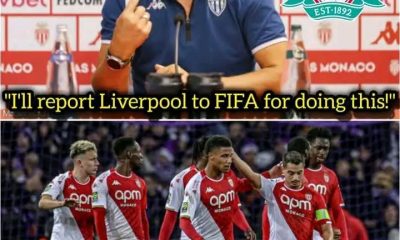
 Liverpool News6 months ago
Liverpool News6 months ago“He visited my office yesterday to inform me about his decision to return to the Anfield this summer. I am not only disappointed in him, but I will also report Liverpool to FIFA for attempting to deceive us.” His return to Liverpool by the summer has been confirmed, but a major issue remains unresolved. HAVING NETTED 15 GOALS IN 6 MATCHES THE MONACO COACH IS DISAPPOINTED IN HIM RETURNING TO LIVERPOOL…..
-

 Featured3 months ago
Featured3 months ago🚨𝐄𝐒𝐂𝐋𝐔𝐒𝐈𝐕𝐀: ARDON JASHARI SARÀ UN NUOVO GIOCATORE DEL MILAN! 🚨 ✅ Accordo totale tra Club Brugge e AC Milan per Ardon Jashari! 🔴⚫️ Il trasferimento si chiuderà su una cifra tra i 37 e i 40 milioni di euro, inclusi bonus, oltre a una percentuale sulla futura rivendita. 💼 Contratto fino almeno al 2030, con stipendio stimato tra 2 e 3,5 milioni a stagione 📝 🔥 Ardon Jashari sarà rossonero. Un colpo chiave per il centrocampo del Milan ✅🔴⚫️
-

 Liverpool News6 months ago
Liverpool News6 months agoIT’S FINALLY OFFICIAL:Trent Alexander-Arnold signs a new long-term contract with Liverpool Amid Motivational Goal Scored Against Leicester City, keeping him at the club until 2028….
-
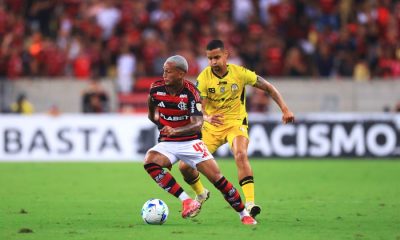
 Featured3 months ago
Featured3 months ago🚨 ULTIM’ORA: CAOS IN SERIE A – La Roma starebbe elaborando un piano terrificante e minaccioso per strappare il difensore brasiliano alla Juventus, ma Tudor ha lanciato un avvertimento chiaro e diretto al club giallorosso, secondo quanto riportano alcune fonti…
-

 Liverpool News6 months ago
Liverpool News6 months agoBREAKING NEWS: Arne Slot Makes Surprise Statement On Trent Alexander-Arnold’s Remaining Games for Liverpool After What Transpired On…



